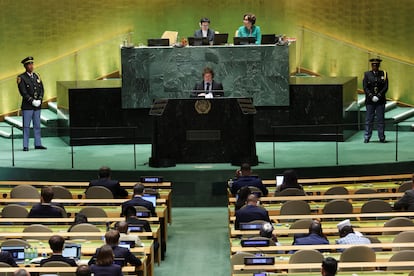Milei burns all his diplomatic bridges in fiery speech at UN General Assembly
The leader of Argentina accused the United Nations of being led by ‘international bureaucrats’ who work to impose ‘a socialist agenda’ on poorer countries


In June, Argentina’s president, Javier Milei, described himself as “the mole that destroys the State from within.” On Tuesday, he appeared to be adopting this role in a fiery speech at the 79th session of the United Nations General Assembly in New York, where he launched verbal attacks against the U.N. and other global organizations. His attitude encapsulated the way that the Argentine government is burning its bridges with the world community. And Milei’s words were accompanied by deeds: the Argentine president refused to add his name to the Pact for the Future, a declaration signed by world leaders that sets the roadmap to face challenges such as sustainable development, climate change and digital cooperation, among others.
The Pact for the Future was approved by 143 countries, including the United States and Israel, Milei’s two beacons when it comes to foreign policy. Argentina refused to participate in the vote, and by doing so it aligned itself with Venezuela, Iran, North Korea, Haiti, Equatorial Guinea, Somalia, and Uzbekistan.
In his address to the General Assembly, Milei praised the organization’s original goal of pursuing world peace, but warned that it has mutated into a “multi-tentacled leviathan” that imposes a socialist agenda on its members. “It has been replaced by a supranational governance model of international bureaucrats who seek to impose a certain way of life on the citizens of the world. What is being discussed this week here in New York is nothing other than the deepening of this tragic course that this institution has adopted,” he stressed.
Without losing his virulent tone, the La Libertad Avanza leader explained why he is turning his back on the sustainable development agenda included in the Pact for the Future and the 2030 Agenda. He believes that they propose to “solve the problems of modernity with solutions that infringe on the sovereignty of nation states and violate people’s right to life, liberty, and property.”
Climate change, one of the greatest threats to the planet, was absent from Milei’s message. Despite the evidence provided by scientists on global warming, Milei has described it as “another lie of socialism” and opposes any mitigation policy if it represents an obstacle to economic growth.
The position taken by Milei at the U.N. isolates Argentina even more. Since the president took office nine months ago, Argentine diplomacy has suffered in its relations with Spain, China, Mexico, Brazil, Colombia and Chile. Only a victory for Donald Trump in the U.S. election in November would give Milei a strong partner that he currently lacks.
In his nine months as president, he has traveled to the United States, his favorite destination, six times. Yet he has not once been received by President Joe Biden or by any senior government official. His agenda has focused on giving speeches in conservative political and economic circles and holding meetings with business leaders such as Elon Musk.
The political clashes add to an inherited problem on the economic front: Argentina’s lack of integration into the international financial system due to its long history of defaulting on payments. The Latin American country has no access to credit in external markets and it relies on the International Monetary Fund (IMF) and multilateral organizations such as the World Bank and the Inter-American Development Bank to obtain fresh funds. In 2018, Argentina received a $44 billion bailout from the IMF that it is still repaying, but the Argentine government is in negotiations to close a new agreement.
On Tuesday, Milei did not spare criticism of the global economic architecture: “A toxic relationship has been promoted between global governance policies and international credit organizations, requiring the most neglected countries to commit resources they do not have to programs they do not need, turning them into perpetual debtors to promote the agenda of the global elites.”
His criticism was even more direct against the World Economic Forum, better known as the Davos Forum, which he considered promotes “ridiculous policies with Malthusian blinkers.” He gave as an example one of the programs to combat climate change, “zero emission” policies that, in his opinion, “harm poor countries above all.”
Milei predicted a future of “poverty, brutalization, anarchy and a fatal absence of freedom” if countries do not make a quick U-turn and abandon the Pact for the Future to embrace instead an Agenda for Freedom headed by himself. His radical ideas have given him worldwide popularity and have inflated his ego to the point of proclaiming himself “one of the two most relevant politicians on planet Earth,” along with Trump. Argentina’s statistics are not, however, a good showcase for his ideas: half of the population lives in poverty and Argentina is the only one of the large Latin American countries with an economy in the red. Milei’s exhortations also seem to ignore the fact that, for now at least, he lacks the political allies capable of shaking up the international order.
Sign up for our weekly newsletter to get more English-language news coverage from EL PAÍS USA Edition
Tu suscripción se está usando en otro dispositivo
¿Quieres añadir otro usuario a tu suscripción?
Si continúas leyendo en este dispositivo, no se podrá leer en el otro.
FlechaTu suscripción se está usando en otro dispositivo y solo puedes acceder a EL PAÍS desde un dispositivo a la vez.
Si quieres compartir tu cuenta, cambia tu suscripción a la modalidad Premium, así podrás añadir otro usuario. Cada uno accederá con su propia cuenta de email, lo que os permitirá personalizar vuestra experiencia en EL PAÍS.
¿Tienes una suscripción de empresa? Accede aquí para contratar más cuentas.
En el caso de no saber quién está usando tu cuenta, te recomendamos cambiar tu contraseña aquí.
Si decides continuar compartiendo tu cuenta, este mensaje se mostrará en tu dispositivo y en el de la otra persona que está usando tu cuenta de forma indefinida, afectando a tu experiencia de lectura. Puedes consultar aquí los términos y condiciones de la suscripción digital.








































